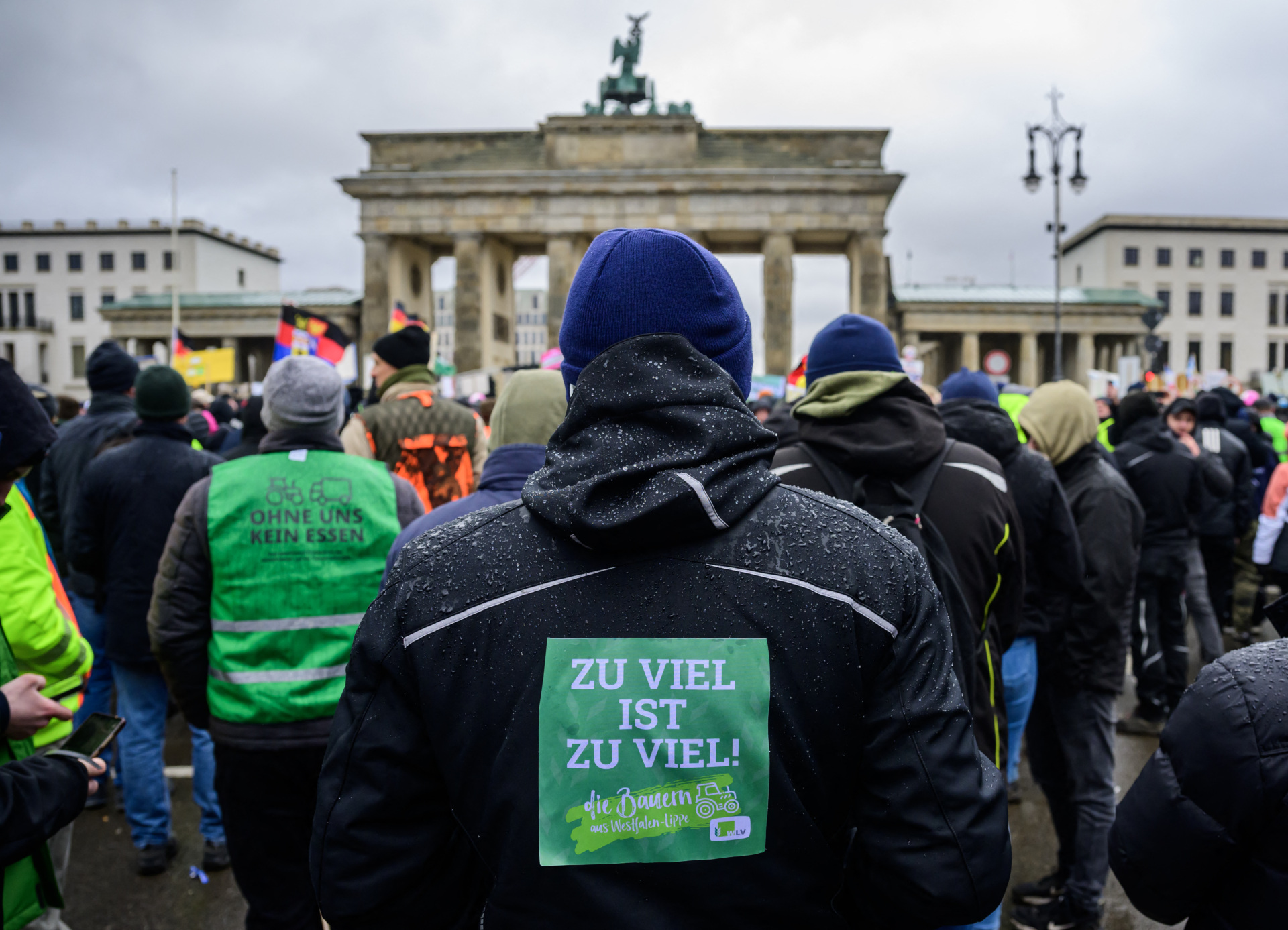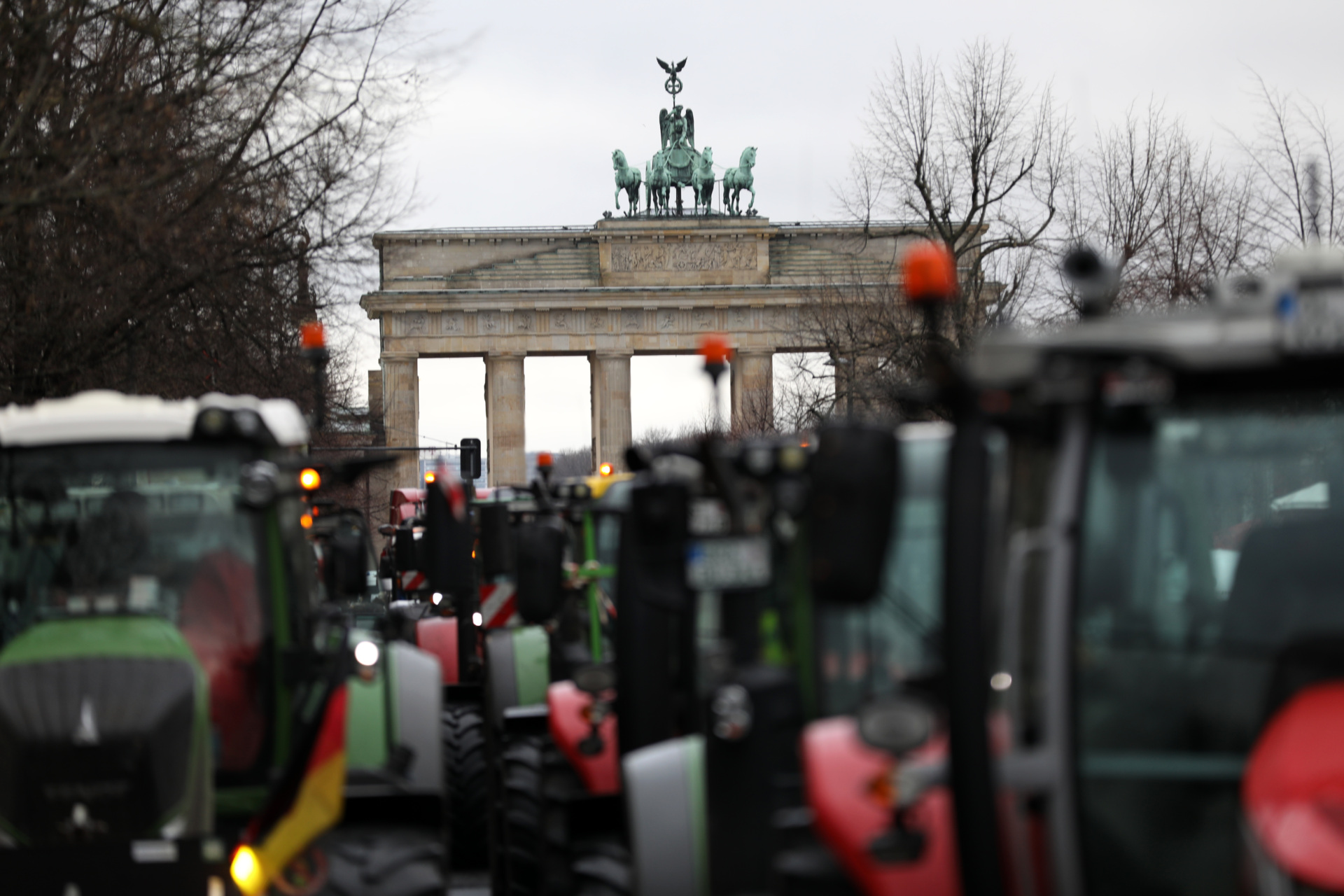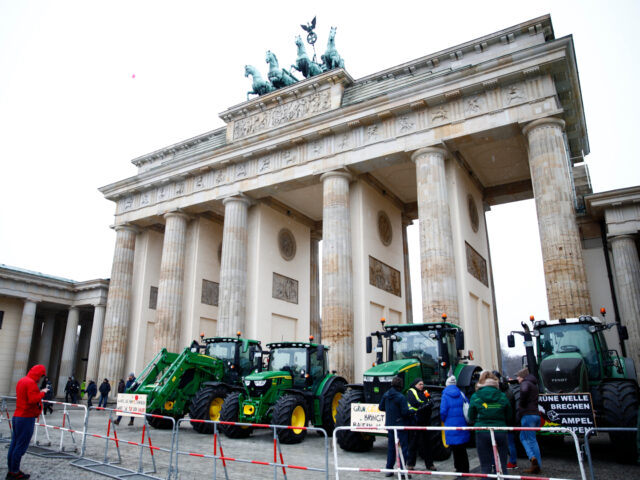Berlin once again ground to a halt on Monday as thousands of farmers, truck drivers and others shut down the German capital, calling for the end of the globalist government of Chancellor Olaf Scholz.
Culminating a week of nationwide demonstrations in which thousands of farmers took to their tractors to shut down typically busy highways and the thoroughfares of major cities, an estimated 5,000 tractors, trucks and over 10,000 people crowded into the centre of Berlin on Monday.
The protests were sparked by the left-wing coalition government’s decision to solve a budget crisis with cuts to agricultural subsidies and eliminating tax exemptions for farmers on diesel, a measure that has been in place for over 70 years.
Meanwhile, the government not only refused to cut any aid to Ukraine, it doubled down on propping up the proxy war effort against Russia, vowing to double payments to Kyiv this year to eight billion euros.

A demonstrator wears a sticker on his jacket reading: “Too much is too much” in front of Berlin’s landmark Brandenburg Gate during a protest of farmers and truck drivers, on January 15, 2024 in Berlin. (Photo by John MACDOUGALL / AFP) (Photo by JOHN MACDOUGALL/AFP via Getty Images)
While the protests came with specific demands, they have grown into a symbol of anger against the left-wing government of Olaf Scholz as a whole.
The establishment media in Germany and internationally have tried to brand the uprising as an opportunity for the so-called “far-right”, noting that it comes amid soaring support for the populist Alternative for Germany (AfD) party.
The government has also attempted to denigrate the movement, with Green Party Economy Minister Robert Habeck risibly claiming that the protests were spurred on by Russian propaganda.
However, Ursula Münch, the director of the Academy for Political Education in Tutzing, pointed to the green agenda pushed by the European Union and enforced by the government in Berlin as the chief reason for the groundswell of resentment by the farmers, who feel as if they have been sidelined as swaths of regulations are imposed upon them without proper consideration of the economic impacts.
Münch said that the government’s aim to eliminate fossil fuels has been seen as government overreach into the economy, telling Deutsche Welle that people feel it “directly in their purses and wallets, their own basements and garages… That is the actual change that made people see this state as intrusive all of a sudden.”
The palpable anger against the government was put on full display as the leader of the coalition partner Free Democratic Party (FDP) and Finance Minister Christian Lindner attempted to address the crowd in Berlin. Yet, in a deeply embarrassing moment for the government minister, Lindner was roundly booed and shouted down by the crowd as he tried to speak.
According to broadcaster NTV, the crowd frequently broke out into chants of “the traffic light has to go!” — a reference to the monicker given to the coalition government given the respective colours of the three main parties, with red for the Social Democrats (SPD), yellow for the FDP, and green for the Greens. There were demands for “new elections immediately” and that the “government should resign”.
The broadcaster went on to say that there were shouts of “our country first” as many criticised the government for “warmongering” over its backing of the Ukraine war while sending billions of hard-earned taxpayer money to Kyiv rather than pushing for a peace settlement with Russia.

BERLIN, GERMANY – JANUARY 15: Tractors of protesting farmers stand in front of the Brandenburg gate during a large-scale demonstration on January 15, 2024 in Berlin, Germany. (Photo by Maryam Majd/Getty Images)
Since the protests broke out last week, the government has largely refused to back down from its position, with the exception of offers to spread the subsidies cuts out over a multiple-year period rather than all at once. However, it has been unwilling to walk back the effective tax hike on the diesel required by farmers to operate their equipment and vehicles.
Although Monday was the last day of scheduled protests, the head of the Farmer’s Association, the organisation’s leader Joachim Rukwied, set a deadline of Thursday for the government to meaningfully address their grievances given that it aligns with the next budget adjustment meeting.
“Now it’s primarily about agricultural diesel. This tax increase must be taken off the table. Otherwise, we would be driving the most expensive agricultural diesel alongside the Dutch in all of Europe. A massive competitive disadvantage,” Rukwied explained, adding that while the farmers do not wish to hold more protests if the deadline is breached, “we reserve the right to take further action.”

COMMENTS
Please let us know if you're having issues with commenting.